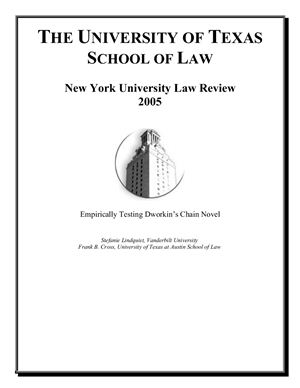New York University Law Review, Vol. 80, p. 1156, 2005
Abstract:
This article provides an empirical study of the effect of precedent on judicial decisionmaking. Precedent is much analyzed as a controlling factor for judicial decisions but rarely tested for its effect. Some have argued that reliance on precedent creates a system of path dependence of the law, which may yield undesirable herd behavior. As a framework for the study of precedent, we use Dworkin's metaphor of a chain novel, in which each deciding judge writes upon a background to which he or she must adhere, thereby influencing his decisions. This yields testable hypotheses about judicial decisionmaking. Given the considerable data on the ideological component of judicial decisionmaking, it provides a means to study the effect of precedent, as a constraint on judicial ideology. First, we examine cases of first impression, for which there is no controlling precedent, like the very first chapter of a chain novel. The hypothesis is that the absence of precedent in these cases frees judges to use their ideology to a greater degree than in other cases with precedents, and this hypothesis is confirmed. Judges render more ideological opinions in cases of first impression. The second study considers the growth of precedent over time in the context of 42 U.S.C. Section 1983 litigation. The hypothesis is that as precedents accumulate, they steadily narrow the range of judicial discretion, so the effect of ideology should dwindle over time, as might be expected from a chain novel. The data falsify this hypothesis, as ideology seems to increase somewhat as a determinant as more precedents build up. The results suggest that precedent acts as only a limited constraint on judicial decisionmaking and the path dependence of a system of stare decisis is exaggerated.
Number of Pages in PDF File: 64
Accepted Paper Series
Date posted: February 17, 2006
Abstract:
This article provides an empirical study of the effect of precedent on judicial decisionmaking. Precedent is much analyzed as a controlling factor for judicial decisions but rarely tested for its effect. Some have argued that reliance on precedent creates a system of path dependence of the law, which may yield undesirable herd behavior. As a framework for the study of precedent, we use Dworkin's metaphor of a chain novel, in which each deciding judge writes upon a background to which he or she must adhere, thereby influencing his decisions. This yields testable hypotheses about judicial decisionmaking. Given the considerable data on the ideological component of judicial decisionmaking, it provides a means to study the effect of precedent, as a constraint on judicial ideology. First, we examine cases of first impression, for which there is no controlling precedent, like the very first chapter of a chain novel. The hypothesis is that the absence of precedent in these cases frees judges to use their ideology to a greater degree than in other cases with precedents, and this hypothesis is confirmed. Judges render more ideological opinions in cases of first impression. The second study considers the growth of precedent over time in the context of 42 U.S.C. Section 1983 litigation. The hypothesis is that as precedents accumulate, they steadily narrow the range of judicial discretion, so the effect of ideology should dwindle over time, as might be expected from a chain novel. The data falsify this hypothesis, as ideology seems to increase somewhat as a determinant as more precedents build up. The results suggest that precedent acts as only a limited constraint on judicial decisionmaking and the path dependence of a system of stare decisis is exaggerated.
Number of Pages in PDF File: 64
Accepted Paper Series
Date posted: February 17, 2006

